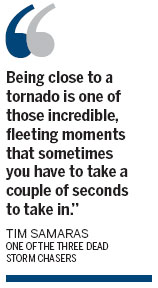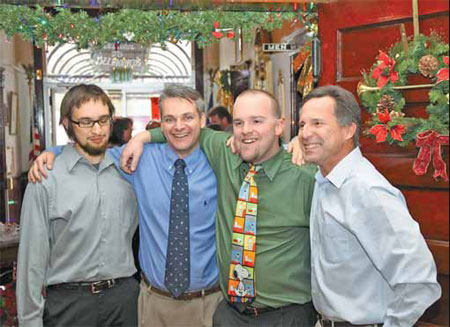Veteran storm chasers killed by tornado in Oklahoma
|
From left: Paul Samaras, Carl Young, Tony Laubach and Paul's father Tim pose in an undated photo. Paul and Tim Samaras were killed on Friday along with Carl Young near El Reno, Oklahoma, as they followed tornadoes that hit the state. Tony Laubach / Handout via Reuters |
|
Brian Vitsmun removes debris from his home that was destroyed by a tornado on Sunday in Moore, Oklahoma. Residents of the city continue to recover and sift through the remains of their homes two weeks after a devastating tornado ripped through the town killing 24 people and destroying hundreds of homes and businesses. Justin Sullivan / Getty Images via AFP |

Three veteran storm chasers died doing what they loved: roaming the Great Plains in search of dangerous storms like the one in Oklahoma that ended their final pursuit.
Tim Samaras, his son Paul and colleague Carl Young, who through the years had shared dramatic videos with television viewers and weather researchers, died on Friday night when an EF3 tornado with winds up to 265 kph turned on them near El Reno, Oklahoma. They were among 13 people who died in the storm in Oklahoma City and its suburbs.
Their deaths in pursuit of the storm are believed to be the first among scientific researchers while chasing tornadoes, the Storm Prediction Center in Norman, Oklahoma, said.
"They put themselves in harm's way so that they can educate the public about the destructive power of these storms," said Chris West, the under-sheriff in Canadian County, where the men died.
Tim Samaras, 54, and Paul Samaras, 24, both of Bennett, Colorado, were trapped in their car along with Young, 45, of South Lake Tahoe, which straddles the California and Nevada border.
Many times before, Tim Samaras had told anyone who would listen that tornadoes were unpredictable.
"I don't know if I would say I worried about it because one of the biggest things he stressed was safety," said Tim's brother, Jim Samaras, who confirmed the deaths "He knew what to look for. He knew where not to be and in this case, the tornado took a clear turn toward them."
Tim Samaras and his Twistex tornado chase team had been featured on the Discovery Channel and given grants by the National Geographic Society. They also were regular presenters at conferences dedicated to advances in meteorology.
The Oklahoma storm that killed the three chasers developed before their eyes on Friday.
Tim Samaras tweeted a photo of clouds rising through a volatile atmosphere and noted: "Storms now initiating south of Watonga along triple point. Dangerous day ahead for OK - stay weather savvy!"
It was his final tweet.
"He looked at tornadoes not for the spotlight of TV but for the scientific aspect," Jim Samaras said. "At the end of the day, he wanted to save lives and he gave the ultimate sacrifice for that."
The tornado in the classic movie The Wizard of Oz fascinated a then-6-year-old Tim Samaras, his brother said.
"He didn't give a crap about Toto, he didn't give a crap about the Munchkins," Jim Samaras said, referring to characters in the film.
The storm arrived during Friday night's rush hour, when roads were clogged with commuters and others trying to flee the storm. Video taken by a number of storm chasers showed debris pelting vehicles.
Winds swept one vehicle with a crew from The Weather Channel off the road, tossed it 200 yards (180 meters) and flipped it into a field. The crew members escaped without any serious injuries.
"This is a very sad day for the meteorological community and the families of our friends lost. Tim Samaras was a pioneer and great man," Weather Channel meteorologist Jim Cantore tweeted on Sunday.
The Discovery Channel, which featured Tim Samaras on Storm Chasers until last year, planned to dedicate a show on Sunday evening to the three men, noting they died "doing what they love, chasing storms".
The National Geographic Society called Tim Samaras a "courageous and brilliant scientist" and posted on its website an interview conducted with him last month.
"Being close to a tornado is one of those incredible, fleeting moments that sometimes you have to take a couple of seconds to take in," he said in the interview, which went on to describe his engineering background and the need for tornado research.
"We still don't know why some thunderstorms create tornadoes while others don't," he added. "We're trying to collect as many observations as possible, both from outside and from the inside. If we better understood some of the final mechanisms for tornado genesis, our forecasting will be greatly improved."
(China Daily 06/04/2013 page10)










